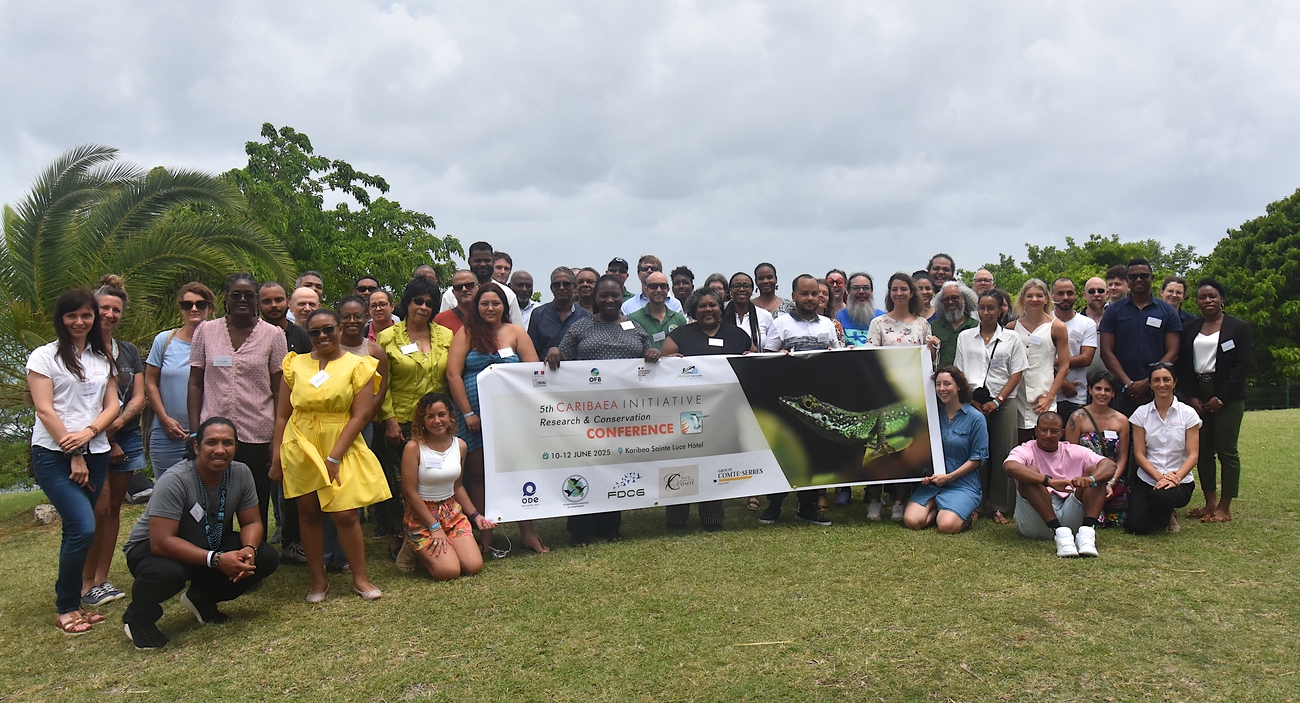The Caribaea Initiative Research & Conservation Conference, held from June 10 to 12, 2025, in Martinique, brought together researchers, professionals, and conservation stakeholders from across the Caribbean and beyond. The event held special significance as it coincided with the 10th anniversary of the association.
Caribaea Initiative’s core mission is to strengthen research and conservation capacities in the countries and territories of the insular Caribbean. In line with this mission, the association organizes an international scientific conference every two years — a true platform for exchange and collaboration between researchers, managers, students, and field practitioners. This unique event in the region aims to share and advance knowledge, promote cooperation among Caribbean territories, and foster a regional network of experts.
Strong regional and international participation
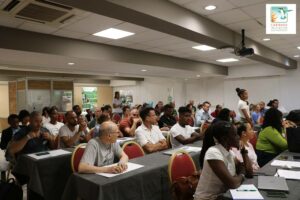 The fifth edition of the conference confirmed both its strong regional roots and its international reach, bringing together a wide range of participants from diverse geographical and institutional backgrounds.
The fifth edition of the conference confirmed both its strong regional roots and its international reach, bringing together a wide range of participants from diverse geographical and institutional backgrounds.
A total of 72 participants from 18 countries or territories attended the conference, including 13 from the insular Caribbean. Among the territories represented were Canada, Cuba, Dominica, France, Guadeloupe, Haiti, Jamaica, Martinique, Puerto Rico, Saint Kitts and Nevis, Saint Lucia, Saint Eustatius, Saint Martin, the Dominican Republic, Sweden, Trinidad and Tobago, the United Kingdom, and the United States.
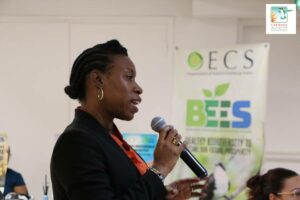 A rich diversity of profiles and institutions was present, including several Caribbean universities (University of the West Indies, University of Trinidad and Tobago, Université des Antilles, Ross University School of Veterinary Medicine), governmental organizations (French Office for Biodiversity, DEAL Martinique, Forestry, Wildlife and Parks Division of Dominica…), as well as scientific and institutional bodies such as CIRAD, INRAE, CNRS, Institut Pasteur of Guadeloupe, the Water Office of Martinique, and the Grand Port Maritime of Martinique. Field-based NGOs also took part, such as the Martinican association Roots of the Sea, the Haiti National Trust, and the St. Eustatius National Parks Foundation. We were also honored to welcome a delegation from the Organization of Eastern Caribbean States (OECS), highlighting the growing interest of regional institutions in strengthened cooperation around biodiversity conservation in the Caribbean.
A rich diversity of profiles and institutions was present, including several Caribbean universities (University of the West Indies, University of Trinidad and Tobago, Université des Antilles, Ross University School of Veterinary Medicine), governmental organizations (French Office for Biodiversity, DEAL Martinique, Forestry, Wildlife and Parks Division of Dominica…), as well as scientific and institutional bodies such as CIRAD, INRAE, CNRS, Institut Pasteur of Guadeloupe, the Water Office of Martinique, and the Grand Port Maritime of Martinique. Field-based NGOs also took part, such as the Martinican association Roots of the Sea, the Haiti National Trust, and the St. Eustatius National Parks Foundation. We were also honored to welcome a delegation from the Organization of Eastern Caribbean States (OECS), highlighting the growing interest of regional institutions in strengthened cooperation around biodiversity conservation in the Caribbean.
Three days of science, discussion… and conviviality
The scientific program featured 40 diverse oral presentations, including three plenary lectures, and 18 scientific posters, spread over three intense days. Many participants had the opportunity to present their work and engage in discussions around their research.
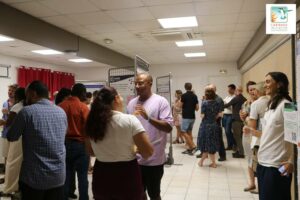 The first day was dedicated to the symposium on “Ecology and conservation of aquatic ecosystems and species in the insular Caribbean,” organized with the support of the Water Office of Martinique. The presentations throughout the day highlighted research related to both marine and freshwater environments. The day ended with a poster session featuring 18 scientific posters, bringing together authors and attendees in a friendly and engaging atmosphere.
The first day was dedicated to the symposium on “Ecology and conservation of aquatic ecosystems and species in the insular Caribbean,” organized with the support of the Water Office of Martinique. The presentations throughout the day highlighted research related to both marine and freshwater environments. The day ended with a poster session featuring 18 scientific posters, bringing together authors and attendees in a friendly and engaging atmosphere.
The second day focused on numerous oral presentations on a wide range of topics related to the study and conservation of animal biodiversity in the region. The day concluded with a major highlight: the symposium on “Regional cooperation for the conservation of biodiversity and ecosystems in Haiti,” which included a roundtable discussion. The energy of the exchanges and the strong interest shown by the audience even led to an impromptu extension of the discussion, reflecting both the relevance of the topic and the engagement of the participants.
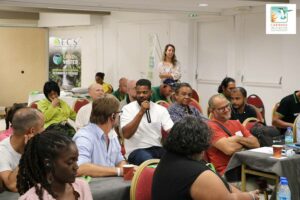 The final day opened with a short session dedicated to environmental education, followed by the symposium on “Hunting, wildlife management and conservation in the insular Caribbean” — another major highlight of the conference, made possible with the support of the departmental hunting federations of Guadeloupe and Martinique. This symposium, which included simultaneous French-English interpretation allowing everyone to speak in their preferred language, enabled open, constructive, and respectful exchanges between scientists, federation representatives, managers, NGOs, and other institutional stakeholders. It concluded with a particularly well-received roundtable, which once again extended beyond the scheduled time.
The final day opened with a short session dedicated to environmental education, followed by the symposium on “Hunting, wildlife management and conservation in the insular Caribbean” — another major highlight of the conference, made possible with the support of the departmental hunting federations of Guadeloupe and Martinique. This symposium, which included simultaneous French-English interpretation allowing everyone to speak in their preferred language, enabled open, constructive, and respectful exchanges between scientists, federation representatives, managers, NGOs, and other institutional stakeholders. It concluded with a particularly well-received roundtable, which once again extended beyond the scheduled time.
An emotional closing banquet
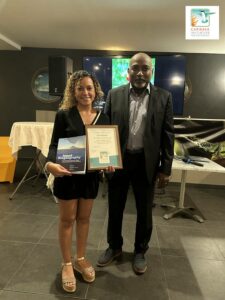 On the final evening, a friendly banquet brought the conference to a festive close. Several key moments marked this closing night. The awards ceremony for the photo contest organized by Caribaea Initiative revealed for the first time the 25 finalist images, selected for their aesthetic quality and naturalist value. Maikel Canizares (Cuba), one of the honorable mention winners who attended the conference, was presented with a certificate to warm applause.
On the final evening, a friendly banquet brought the conference to a festive close. Several key moments marked this closing night. The awards ceremony for the photo contest organized by Caribaea Initiative revealed for the first time the 25 finalist images, selected for their aesthetic quality and naturalist value. Maikel Canizares (Cuba), one of the honorable mention winners who attended the conference, was presented with a certificate to warm applause.
The “Dawn T. Phillips Award” for the best student oral presentation was then awarded to Carla Ivette Rivera-Pérez (Puerto Rico), a PhD student at Ross University, for her work on manatee conservation. She was ranked first among ten students who gave oral presentations, evaluated by a jury of five researchers based on scientific value, conservation relevance, and overall quality.
Finally, a set of field equipment — spotting scope, binoculars, camera, and various field tools — was donated to our partner in Dominica, the Forest, Wildlife and Parks Division, as part of the launch of a joint project focused on the Imperial Amazon (Amazona imperialis), a critically endangered and endemic species.
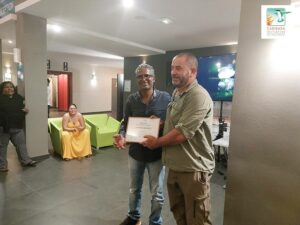
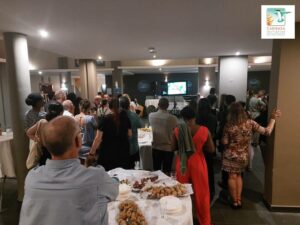
A collective success, a stronger network
Beyond the quality of the presentations, it was the richness of the exchanges and interactions that left a lasting impression: almost every talk sparked lively and constructive discussions through questions and comments from the audience. Both roundtable sessions generated unanimous enthusiasm.
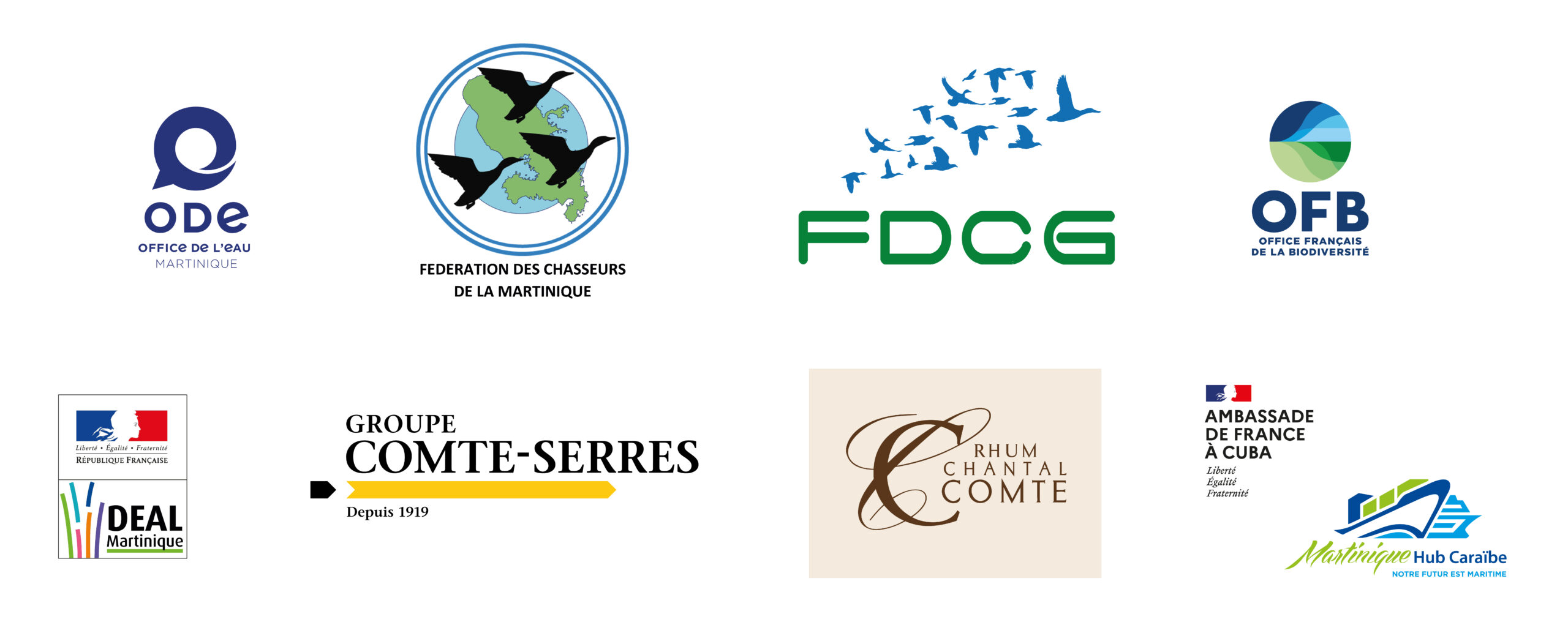 This event, the result of a full year of preparation by the Caribaea Initiative team, would not have been possible without the support of our sponsors, whom we warmly thank: the Martinique Hunting Federation, the Guadeloupe Hunting Federation, Groupe Comte-Serres, and Rhum Chantal Comte (Gold partners); the French Office for Biodiversity, DEAL Martinique, and the Water Office of Martinique (Silver partners); as well as the Grand Port Maritime of Martinique and the French Embassy in Cuba (Bronze partners). More details on the sponsors are available on the conference page.
This event, the result of a full year of preparation by the Caribaea Initiative team, would not have been possible without the support of our sponsors, whom we warmly thank: the Martinique Hunting Federation, the Guadeloupe Hunting Federation, Groupe Comte-Serres, and Rhum Chantal Comte (Gold partners); the French Office for Biodiversity, DEAL Martinique, and the Water Office of Martinique (Silver partners); as well as the Grand Port Maritime of Martinique and the French Embassy in Cuba (Bronze partners). More details on the sponsors are available on the conference page.
Appreciated media coverage
The event attracted media attention, with a full-length article published in France-Antilles Martinique in both print and digital formats on June 13, 2025 (read the article online). Radio station RCI Martinique also featured a report on the conference in its 1 p.m. news broadcast on June 14, including an interview with Christopher Cambrone (listen to the report).
Both media outlets presented the overall event but placed particular emphasis on the symposium “Hunting, wildlife management and conservation in the insular Caribbean,” which was rightly considered one of the highlights of the conference, thanks to the diversity of speakers and the depth of the discussions it inspired.
What’s next?
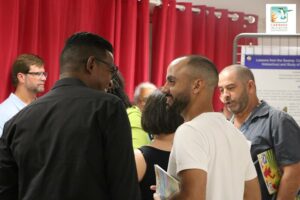 The next edition of the Caribaea Initiative Conference is already scheduled for 2027. The location is yet to be confirmed, with several options currently under consideration, including Trinidad & Tobago and Saint Martin. Meanwhile, a capacity-building workshop is expected to take place in 2026, most likely in the French West Indies.
The next edition of the Caribaea Initiative Conference is already scheduled for 2027. The location is yet to be confirmed, with several options currently under consideration, including Trinidad & Tobago and Saint Martin. Meanwhile, a capacity-building workshop is expected to take place in 2026, most likely in the French West Indies.
We hope that the discussions initiated during this 5th edition will continue to spark new ideas, foster fresh collaborations, and lead to projects that we look forward to discovering at the next conference in two years’ time.
Learn more about the 2025 conference: https://www.caribaea.org/en/outreach/conferences/conference-2025/

